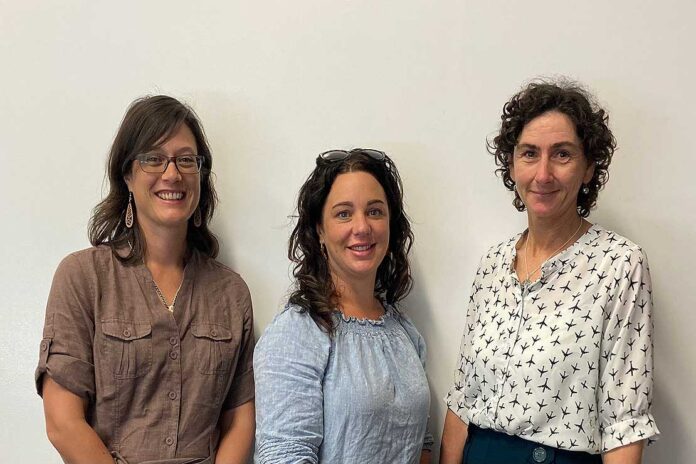Source: Massey University
(L-R) Project leads Dr Felicity Ware, Dr Chrissy Severinsen and Dr Mary Breheny.
“I was depressed, isolated and exhausted, even when baby was sleeping through. I struggled to do anything. I never had enough time with my Well Child nurse to even begin to broach these topics.”
This kōrero is just one of the mounting submissions made to Wāhi Kōrero, an online platform providing people an anonymous space to share their experiences with the health system. The platform was recently launched by Massey University researchers, and in less than two weeks over 150 submissions have been made. The information shared is already providing valuable insights that will inform policy makers in the future.
Massey University Public Health Senior Lecturer and Wāhi Kōrero co-lead Dr Chrissy Severinsen says hearing these first-hand accounts will provide new and transformative knowledge that will significantly advance understanding of public health challenges. “If we can improve our understanding of what shapes relationships between whānau and healthcare providers, we can make better recommendations for how to strengthen those relationships.”
It is known that health services struggle to provide accessible, quality and non-discriminative health services to Māori. Dr Severinsen says that the research will seek to address these health service experiences for Māori as a way to improve health outcomes and reduce persistent health inequities. “The knowledge and solutions are held within those we want to engage with for this research. They are the key to unlocking an Aotearoa where every whānau can receive thorough, timely and responsive healthcare.”
Through these accounts, Wāhi Kōrero will provide insight into the ways that social and economic aspects such as racism and poverty play out in health interactions. “Rates of unmet need for Māori, Pacific peoples, women and young people are concerning. These groups have the greatest need for early and reliable access to health services, so we want to understand the drivers behind these rates.”
The first project within the platform prompts users to reflect on ‘Kōrero I wish I could’ve had with my Well Child nurse.’ Massey University Hauora Māori Senior Lecturer and Wāhi Kōrero co-lead Dr Felicity Ware says the research team chose to focus on the relationship with the Well Child nurse because it is one of the key health supports for whānau and tamariki.
“Mums and parents deserve to receive the support they need, when they need it. They deserve to be able to ask for help with confidence they’ll be met with care, compassion, and trust. And to know their tamariki will be given timely and respectful healthcare.”
Victoria University Associate Professor of health psychology Dr Mary Breheny is a co-researcher for the project, and says that Wāhi Kōrero will help share the influence and power of research with marginalised individuals and communities in order to alter the power relationships often present in health settings. “It will provide access to those who often have no voice, who are disadvantaged or disempowered in mainstream environments. These experiences are often missing from traditional consumer surveys and healthcare evaluations.”
Ultimately, the research findings will be presented to those who make policy around healthcare in a way that can’t be ignored, and will include solutions based on the experiences described by those who share their stories.
Dr Breheny says healthcare providers are aware that change in this area is needed. “Since going live, we’ve been contacted by a number of healthcare providers interested in our research and offering their support to what we are trying to achieve.”
Dr Severinsen and Dr Ware were each awarded Massey University Research Fund (MURF) grants for this work. The research team has established a formal partnership with advocacy organisation Action Station to maximise impact.
More information can be found at www.wahikorero.co.nz.
Related articles
Massey staff recognised at Primary Healthcare Awards
Pandemic, Pasifika health and asthma research among Massey’s Marsden successes
Massey awarded three prestigious Fellowships from Health Research Council
New research focused on women’s mental health during pregnancy and post-birth
Created: 15/09/2021 | Last updated: 15/09/2021



